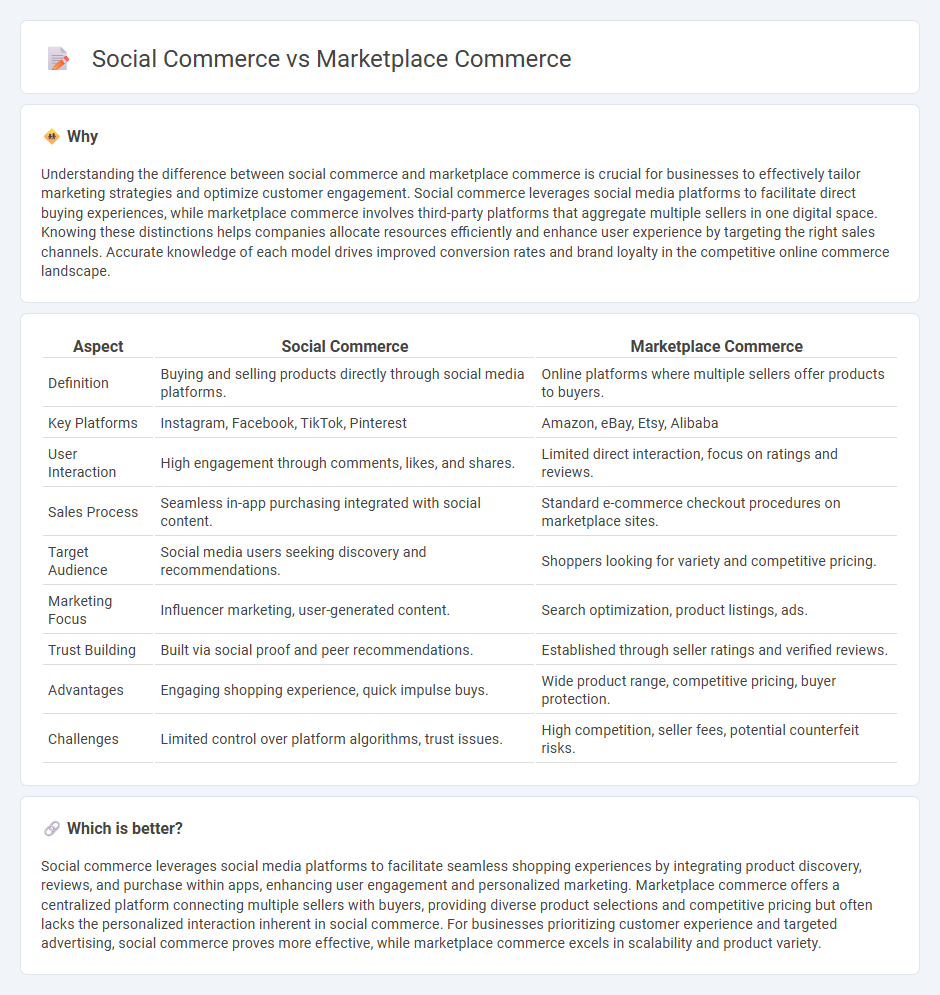
Social commerce leverages social media platforms to facilitate buying and selling directly within user interactions, enhancing personalized shopping experiences and increasing customer engagement. Marketplace commerce involves centralized online platforms where multiple sellers list products, providing extensive variety and competitive pricing to consumers. Explore the differences between social commerce and marketplace commerce to optimize your e-commerce strategy.
Why it is important
Understanding the difference between social commerce and marketplace commerce is crucial for businesses to effectively tailor marketing strategies and optimize customer engagement. Social commerce leverages social media platforms to facilitate direct buying experiences, while marketplace commerce involves third-party platforms that aggregate multiple sellers in one digital space. Knowing these distinctions helps companies allocate resources efficiently and enhance user experience by targeting the right sales channels. Accurate knowledge of each model drives improved conversion rates and brand loyalty in the competitive online commerce landscape.
Comparison Table
| Aspect | Social Commerce | Marketplace Commerce |
|---|---|---|
| Definition | Buying and selling products directly through social media platforms. | Online platforms where multiple sellers offer products to buyers. |
| Key Platforms | Instagram, Facebook, TikTok, Pinterest | Amazon, eBay, Etsy, Alibaba |
| User Interaction | High engagement through comments, likes, and shares. | Limited direct interaction, focus on ratings and reviews. |
| Sales Process | Seamless in-app purchasing integrated with social content. | Standard e-commerce checkout procedures on marketplace sites. |
| Target Audience | Social media users seeking discovery and recommendations. | Shoppers looking for variety and competitive pricing. |
| Marketing Focus | Influencer marketing, user-generated content. | Search optimization, product listings, ads. |
| Trust Building | Built via social proof and peer recommendations. | Established through seller ratings and verified reviews. |
| Advantages | Engaging shopping experience, quick impulse buys. | Wide product range, competitive pricing, buyer protection. |
| Challenges | Limited control over platform algorithms, trust issues. | High competition, seller fees, potential counterfeit risks. |
Which is better?
Social commerce leverages social media platforms to facilitate seamless shopping experiences by integrating product discovery, reviews, and purchase within apps, enhancing user engagement and personalized marketing. Marketplace commerce offers a centralized platform connecting multiple sellers with buyers, providing diverse product selections and competitive pricing but often lacks the personalized interaction inherent in social commerce. For businesses prioritizing customer experience and targeted advertising, social commerce proves more effective, while marketplace commerce excels in scalability and product variety.
Connection
Social commerce integrates social media platforms with direct selling, leveraging user interactions and social proof to enhance purchasing decisions. Marketplace commerce operates as a centralized platform where multiple sellers offer products, enabling broad selection and competitive pricing. The connection lies in social commerce driving traffic and personalized engagement within marketplace ecosystems, boosting sales through influencer marketing and user-generated content.
Key Terms
Platform
Marketplace commerce platforms like Amazon and eBay centralize product listings, offering a wide range of sellers and streamlined purchasing experiences primarily through search and categorization features. Social commerce platforms such as Instagram Shopping and Facebook Shops integrate social interactions, user-generated content, and influencer marketing to facilitate buying directly within social media environments. Explore how these platform distinctions impact user engagement and sales performance in evolving digital markets.
User Interaction
Marketplace commerce centers user interaction on transactional efficiency, enabling buyers and sellers to connect through detailed product listings, reviews, and secure payment systems to facilitate straightforward exchanges. Social commerce emphasizes community engagement and user-generated content, leveraging social media platforms to foster trust, influence purchasing decisions through peer interactions, and enhance brand loyalty via interactive features like live streams and comments. Explore deeper insights into how user interaction shapes the success of marketplace and social commerce models.
Transaction Model
Marketplace commerce operates on a structured transaction model where sellers list products and buyers complete purchases through the platform, ensuring secure payment processing and order fulfillment. Social commerce integrates e-commerce features directly within social media platforms, enabling transactions driven by social interactions, peer recommendations, and influencer endorsements. Explore the nuances of transaction models in marketplace and social commerce to optimize your digital sales strategy.
Source and External Links
Adobe Commerce Marketplace - Experience League - Adobe Commerce Marketplace is an application store offering merchants a curated selection of verified extensions and tools, enabling them to extend online store functionality with secure, high-quality apps developed and reviewed under strict guidelines.
Accessing product and customer data with the AWS Marketplace Commerce Analytics Service - AWS Marketplace Commerce Analytics Service enables programmatic access to product and customer data, providing usage, subscription, and billing reports via AWS SDKs delivered to an Amazon S3 bucket for analytics and integration purposes.
Commerce Marketplace - Salesforce Help - Commerce Marketplace in Salesforce manages and integrates shoppers' and sellers' data within Salesforce B2C Commerce and Salesforce orgs, ensuring data protection and enabling connections between storefronts and marketplace apps.
 dowidth.com
dowidth.com